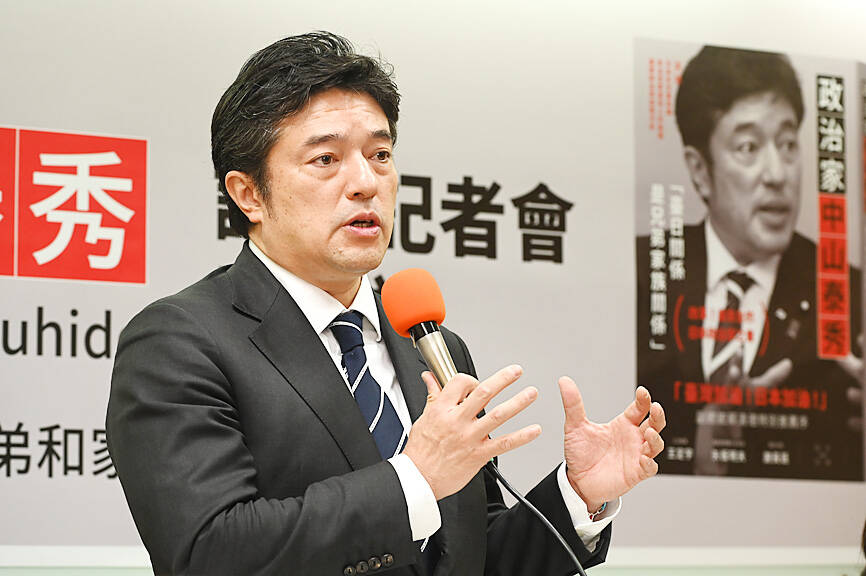Japan is likely to recognize Taiwan as a country should the nation continue to be governed freely and democratically, former Japanese vice minister of defense Yasuhide Nakayama said in Taipei yesterday.
Nakayama visited Taiwan for the first time to promote the Chinese-language version of his book Statesman Yasuhide Nakayama.
Two Japanese House Representatives from the Constitutional Democratic Party recently said that Taiwan had escalated tensions with China, and urged Japanese Prime Minister Fumio Kishida to state that he does not support Taiwanese independence.

Photo: Tien Yu-hua, Taipei Times
“Their statements do not represent the ruling party or the Japanese government. Nor do they have any bearing on government policy,” Nakayama said at a news conference.
However, “Japan is a free and democratic country, and any political party is free to state its position,” he added.
“Taiwan has all the basic elements of a nation — territory, people and a clearly defined population. I believe that it is highly possible that Taiwan will be recognized by Japan as a country if it maintains a free and democratic system,” Nakayama said.
Okinawa Prefecture Governor Denny Tamaki last month told Chinese daily the Global Times that he did not agree with former Japanese prime minister Shinzo Abe’s statement that “a Taiwanese emergency is a Japanese emergency.”
Okinawans would “not allow” the prefecture “to be targeted by military strikes,” Tamaki added.
Asked to respond to the comments, Nakayama said that formulating national defense policy is the jurisdiction of the Japanese government, and statements by local officials do not affect national policy.
Tokyo reportedly is planning to expand military units on Okinawa in anticipation of possible conflicts with China over Taiwan.
Nakayama said the Japanese government has been concerned about China’s ambitions in the South China Sea and the Ryukyu Islands, and that Japan has been increasing its defense budget since the Abe administration, including reinforcing the Ryukyu Islands’ military infrastructure.
It is important that the US, Japan and other democratic allies protect Taiwan and make sure that it is not orphaned by the international community, he said.
In his opening remarks at the news conference, Nakayama cited China and Russia as the two biggest military threats facing Japan.
When China held military exercises in August following the visit to Taiwan by US House of Representative Speaker Nancy Pelosi, five ballistic missiles were reportedly fired into waters that are part of Japan’s exclusive economic zone.
“It was not a coincidence. The Chinese People’s Liberation Army did it on purpose to threaten Japan. This is evidence of why ‘a Taiwanese emergency is Japanese emergency,’” Nakayama said.
“Unlike World War II, nearly 80 years ago, when war was mainly fought on land, at sea and in the air, the battlefields have now expanded to space, cyberspace and electromagnetic technology” that targets radar and communications systems, he said.
Taiwan needs to strengthen its resilience in these new battlefields, and increase partnerships with the US and Japan against possible Chinese attacks, he said.
Ukrainians would not be winning the war against Russia without satellite services provided by Elon Musk, he added.

ENDEAVOR MANTA: The ship is programmed to automatically return to its designated home port and would self-destruct if seized by another party The Endeavor Manta, Taiwan’s first military-specification uncrewed surface vehicle (USV) tailor-made to operate in the Taiwan Strait in a bid to bolster the nation’s asymmetric combat capabilities made its first appearance at Kaohsiung’s Singda Harbor yesterday. Taking inspiration from Ukraine’s navy, which is using USVs to force Russia’s Black Sea fleet to take shelter within its own ports, CSBC Taiwan (台灣國際造船) established a research and development unit on USVs last year, CSBC chairman Huang Cheng-hung (黃正弘) said. With the exception of the satellite guidance system and the outboard motors — which were purchased from foreign companies that were not affiliated with Chinese-funded

PERMIT REVOKED: The influencer at a news conference said the National Immigration Agency was infringing on human rights and persecuting Chinese spouses Chinese influencer “Yaya in Taiwan” (亞亞在台灣) yesterday evening voluntarily left Taiwan, despite saying yesterday morning that she had “no intention” of leaving after her residence permit was revoked over her comments on Taiwan being “unified” with China by military force. The Ministry of the Interior yesterday had said that it could forcibly deport the influencer at midnight, but was considering taking a more flexible approach and beginning procedures this morning. The influencer, whose given name is Liu Zhenya (劉振亞), departed on a 8:45pm flight from Taipei International Airport (Songshan airport) to Fuzhou, China. Liu held a news conference at the airport at 7pm,

Authorities yesterday elaborated on the rules governing Employment Gold Cards after a US cardholder was barred from entering Taiwan for six years after working without a permit during a 2023 visit. American YouTuber LeLe Farley was barred after already being approved for an Employment Gold Card, he said in a video published on his channel on Saturday. Farley, who has more than 420,000 subscribers on his YouTube channel, was approved for his Gold Card last month, but was told at a check-in counter at the Los Angeles International Airport that he could not enter Taiwan. That was because he previously participated in two

Taiwan was ranked the fourth-safest country in the world with a score of 82.9, trailing only Andorra, the United Arab Emirates and Qatar in Numbeo’s Safety Index by Country report. Taiwan’s score improved by 0.1 points compared with last year’s mid-year report, which had Taiwan fourth with a score of 82.8. However, both scores were lower than in last year’s first review, when Taiwan scored 83.3, and are a long way from when Taiwan was named the second-safest country in the world in 2021, scoring 84.8. Taiwan ranked higher than Singapore in ninth with a score of 77.4 and Japan in 10th with